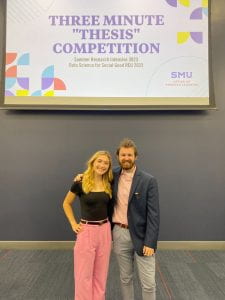On Friday, September 13 pre-major and declared major students received a task and message in my.smu that asked them to complete a path in Degree Planner by October 1st. (This deadline is also listed on SMU’s academic calendar.) Declared major students complete their path when they plan through the semester of their graduation.
This task was applied to everyone, regardless of Degree Planner completion, and will be removed on October 1st, also regardless of completion. Although there is no consequence for students who do not complete Degree Planner, this requirement is a semesterly expectation for all students and advisors.
Please encourage your students to work on a Degree Planner path. When students complete their Degree Planner, the academic advisor job becomes easier in a couple of ways: students will have the start of a plan for course enrollment, and departments will see a clearer picture of course demand for future semesters. The tool only becomes increasingly useful as more students and advisors participate…
Over the next two weeks, students can seek help with Degree Planner in numerous ways:
- Peer Academic Leaders (PALs) Workshops
- September 17th, 5-6pm, Fondren Library room 110
- September 18th, 2-3pm, Fondren Library room 109
- September 25th, 5:30-6:30pm, Fondren Library room 110
- University Advising Center (UAC) Workshops
- September 19th, 9-11am, Fondren Library room 109
- September 23rd, 2-4pm, Fondren Library room 109
- September 24th, 1:30-3:30pm, Fondren Library room 109
- Success Fest: September 26th, 11:30am-1:30pm, Blanton 108/110
- Individual meetings with their advisor and/or a PAL (https://booking.smu.edu/appointments/pals)
SMU installed an update to the Degree Planner software on Thursday, September 12, that should have fixed the technical issues students may have encountered over the summer. If you see issues, technical or otherwise, please use the Degree Planner Issues/Requests Tracker. If students have problems, they should contact the Help Desk.
Finally, Success Fest on September 26th will offer free food, raffles, and games for all students who have completed their Degree Planner… If they still have work to do, advisors will be there to help them finish. Look for more promotion of Success Fest over the next two weeks, and help us get the word out…
Thanks for all of your help, and if you have any questions, let me know.
Josh Beaty
Advising Pillar, SMU in Four







